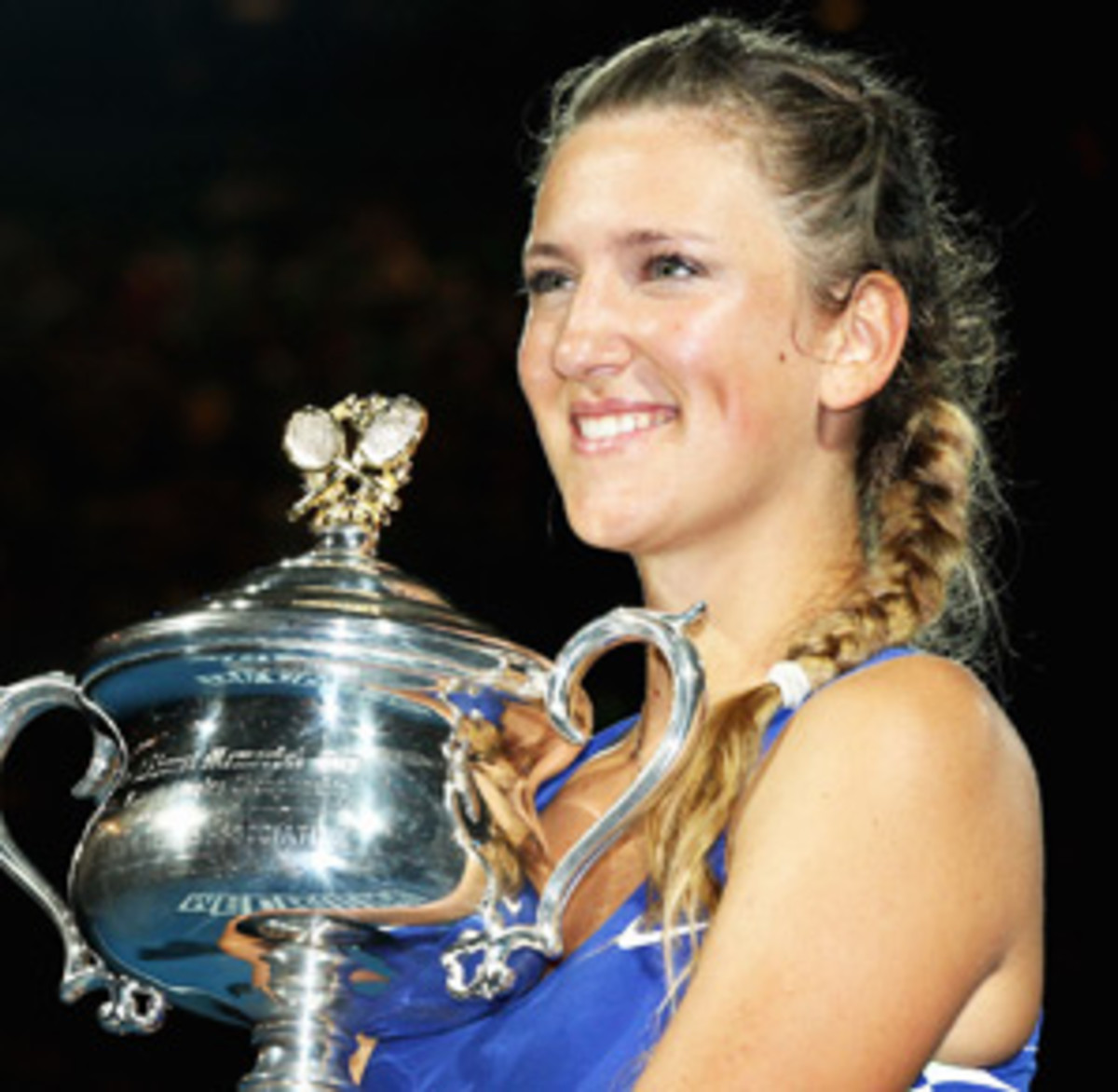Azarenka steamrolls Sharapova to win Australian Open, take No. 1
The win launched her career -- she would go on to win additional major titles -- and certified her as a star. We speak, of course, of Maria Sharapova, who toppled the mighty Serena Williams to win the Wimbledon title in 2004, a day that doubled as her tennis cotillion.
It was easy to summon memories of that match on Saturday, when a first-time Grand Slam finalist faced a heavy-slugging veteran at the Australian Open. And the newcomer didn't just meet the moment; she kicked it in the rear. Except this time, it was Sharapova in the role of the hapless veteran and Victoria Azarenka stealing the scene. In a relentlessly one-sided match, Azarenka officially broke through with a 6-3, 6-0 demolition.
"She was better than me on so many levels," Sharapova said.
That wasn't the case early in the match. For as much confidence as players can project, there's no telling how a first-timer will react to playing a winner-take-all match like this. Half an hour before her court call, the 22-year-old Azarenka was alone in the car park under the stadium, ear buds firmly inserted, dancing and loosening up, but appearing nervous in the extreme. For the first 10 or so minutes of play, it was all butterflies. Azarenka double-faulted twice in the first game, missed routine balls by wide margins and suddenly was down 0-2.
"I was super nervous. I couldn't wait to actually go on the court and play. It was a long wait. I was like, OK, I'm ready to go. I'm ready to go. When is it coming? When is it coming? What time is it?" said Azarenka, who described the first two games as "a little bit of a disaster."
Then, as if simply toggling a switch, she didn't so much turn the match around as she turned it on its head. Azarenka ran off six of the next seven games to take the first set. Usually it's around this time that Sharapova's fighting instincts kick in and she battles back, as she did in the semifinals against Petra Kvitova. Azarenka, though, was almost sadistic in her application of pressure and reeled off six more games, 12 of the final 13 in all. When Sharapova made the last of her (yikes) 30 unforced errors, it memorialized a fairly shocking upset -- the score and rhythm, if not the result.
"Just the perfect ending and the perfect position to be in," Azarenka said.
The book on Azarenka states that she is an aggressive banger, capable of hammering groundstrokes but not much else. That book now needs an update. Azarenka did her share of blasting on Saturday, but she also moved well, won points with nifty work around the net and showed off an arsenal that included a transition game and a nifty drop shot-and-lob combo. Maybe most impressive, she came with a game plan: Push Sharapova back, take control of the rallies and exploit her opponent's inferior movement. Without using words she conveyed a clear message to Sharapova: Hit a winner or lose the point. Mostly, Sharapova went with option B.
"There was no way I was going to win the match if I was going to let her dictate and be the one that's aggressive," Sharapova said. "I think maybe I just kind of overdid it."
Not unlike Roger Federer, Andy Murray and Kim Clijsters, Sharapova leaves Melbourne with a chance to test her powers of positive thinking. Does she recall this tournament for another fine run, a courageous defeat of Kvitova, more progress coming back from a major shoulder surgery -- a procedure that has sounded the career death for plenty of other players? Or does the knowledge that she had a real opportunity to win long-waited Grand Slam title No. 4, but mustered just three measly games in the final, stick in her craw?
"It's tough either way," Sharapova said. "Obviously to get to the final is a good achievement, but to end up being the one that loses is always tough, no matter what sport you're in."
As for Azarenka, in addition to winning her first major title, she also lays claim to the WTA's top ranking. There's been endless chatter about the absence of a dominant presence in the women's game, the need for a player to assert herself on a full-time basis. Well, maybe we have one now.
Azarenka gave a strong accounting of herself. With her preparation. With her play. With her poise. With a result that suggested she ain't messing around. It wasn't just enough to beat Sharapova. It was enough to mute -- at least temporarily -- any discussion of grunting.





